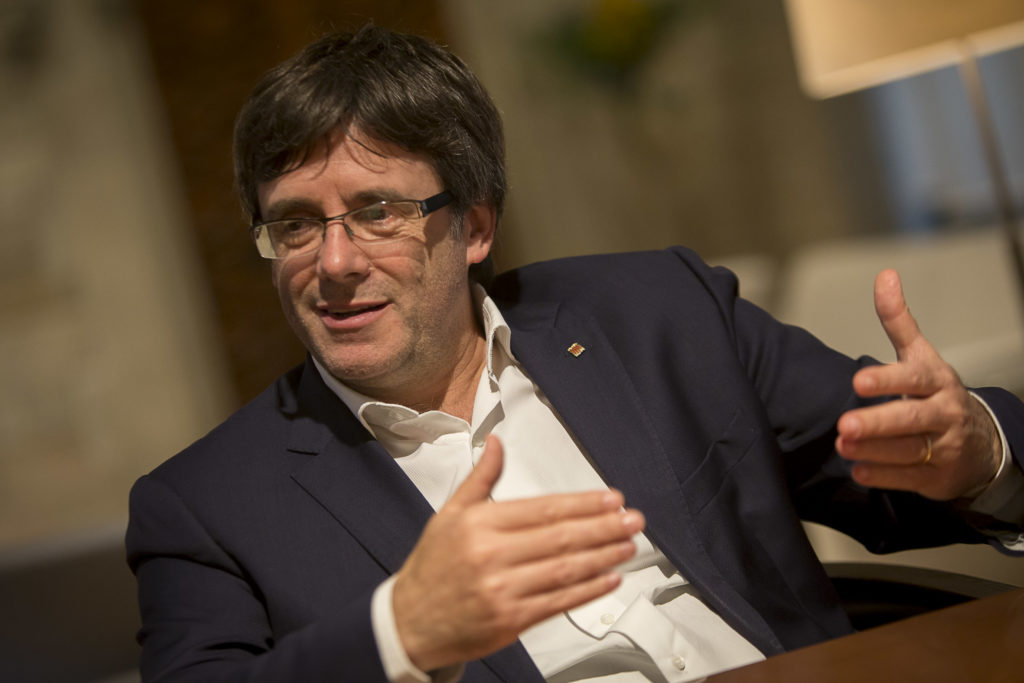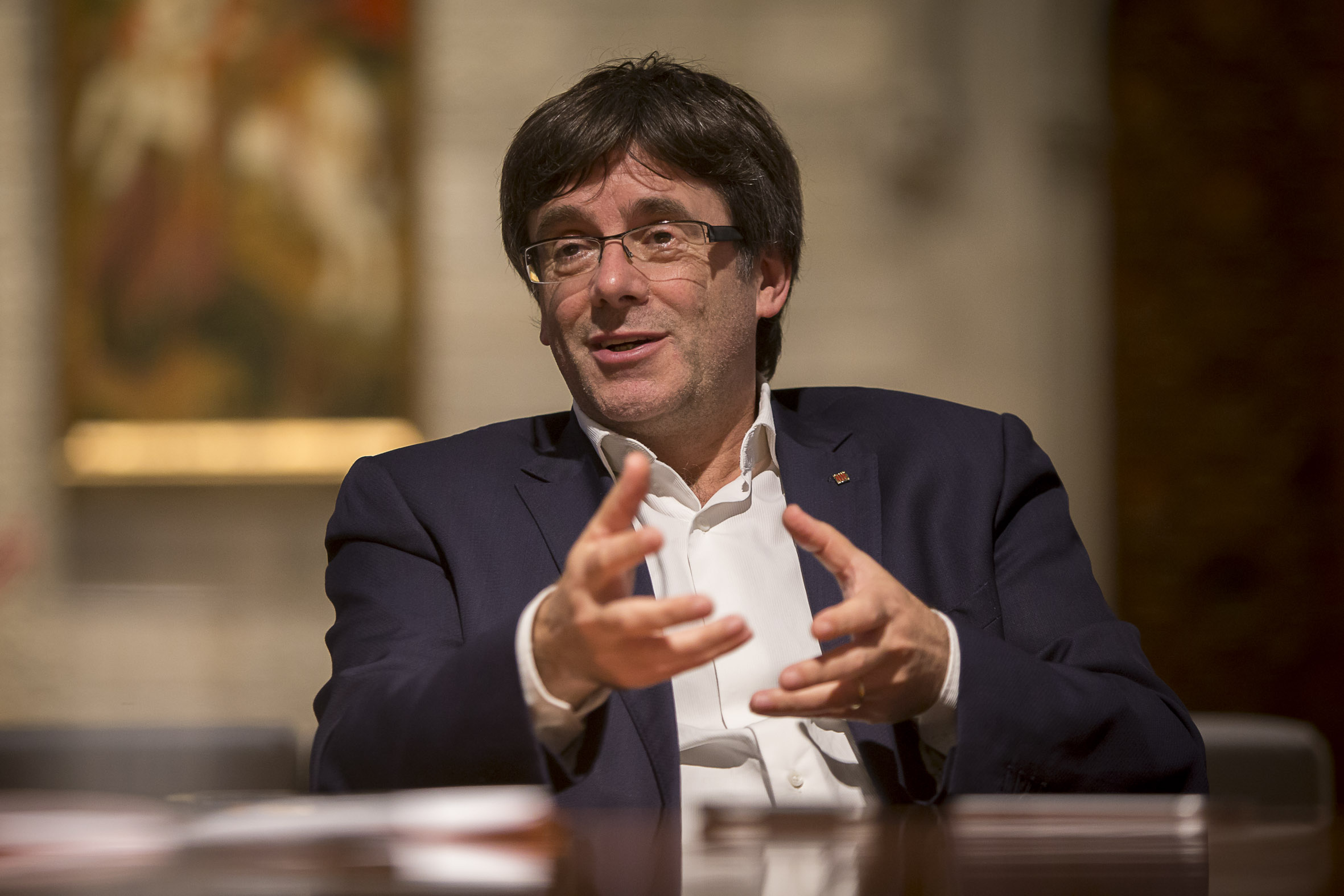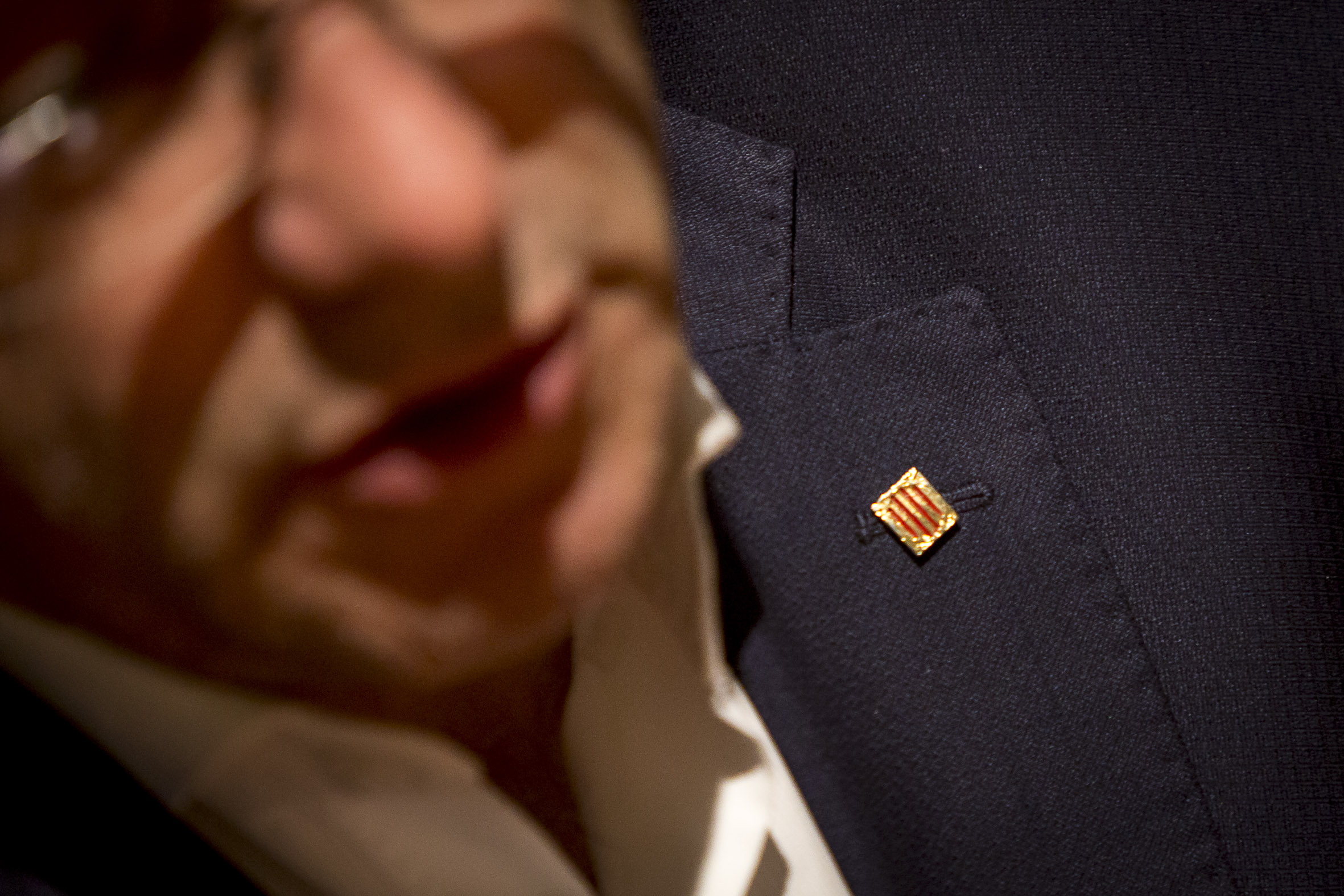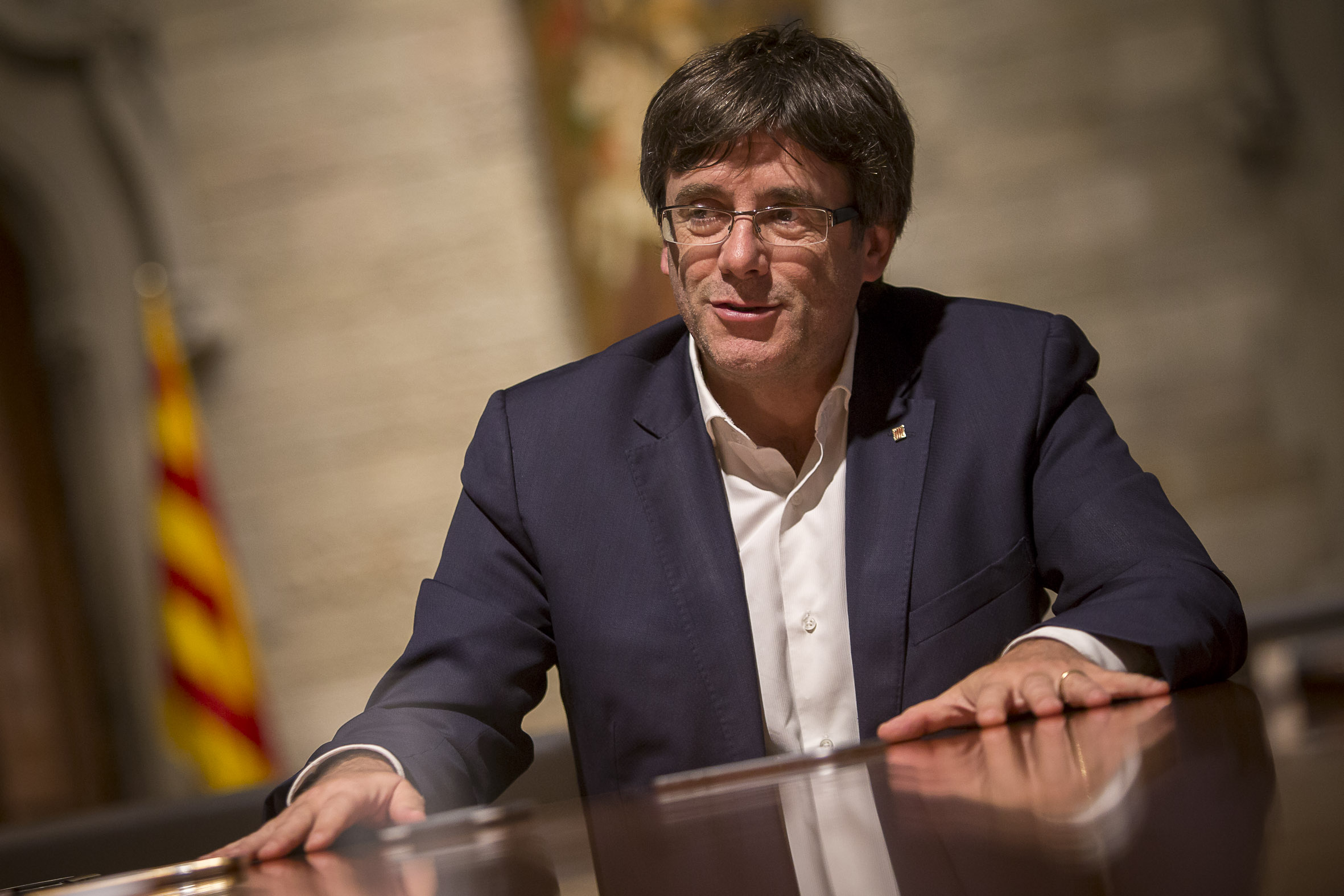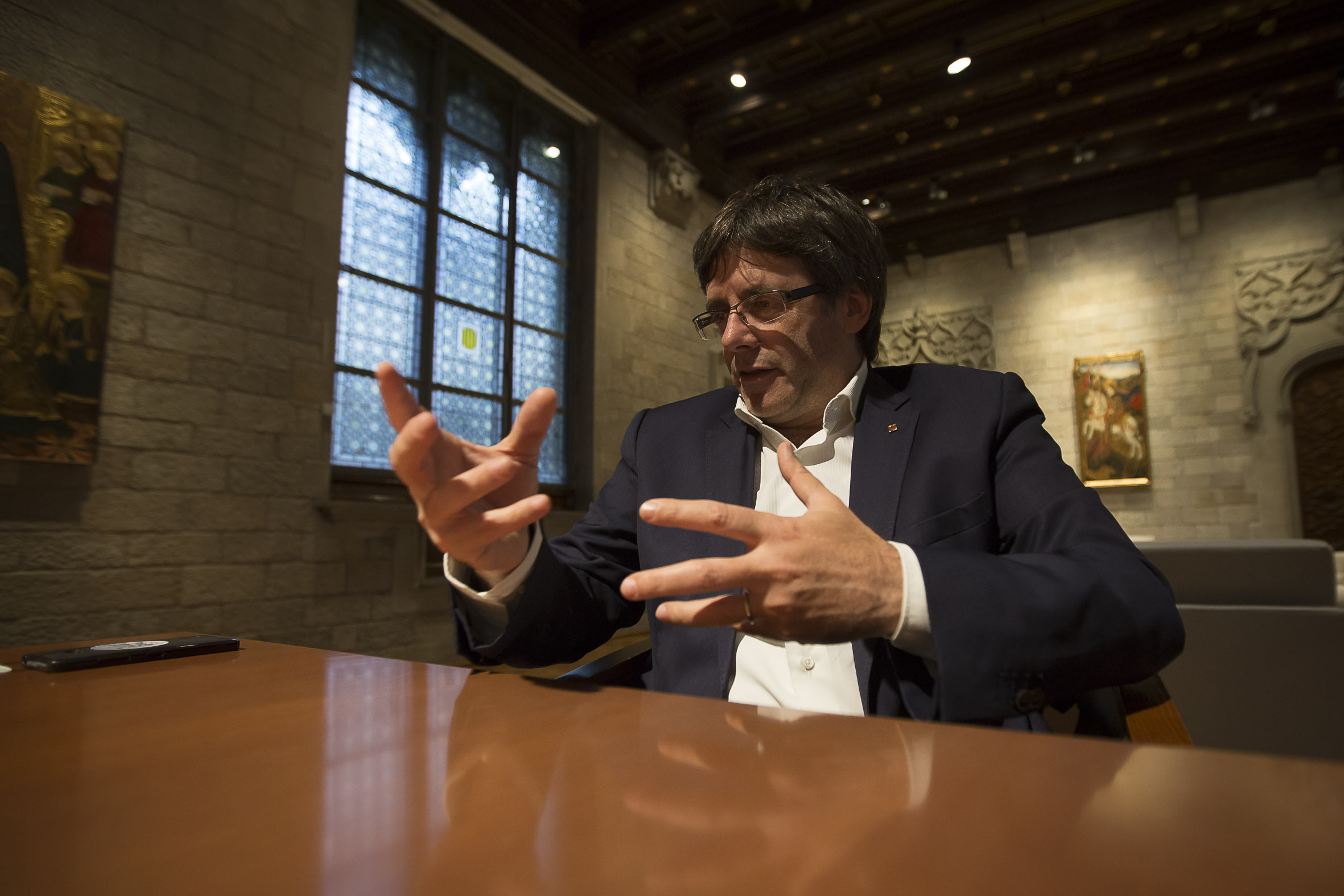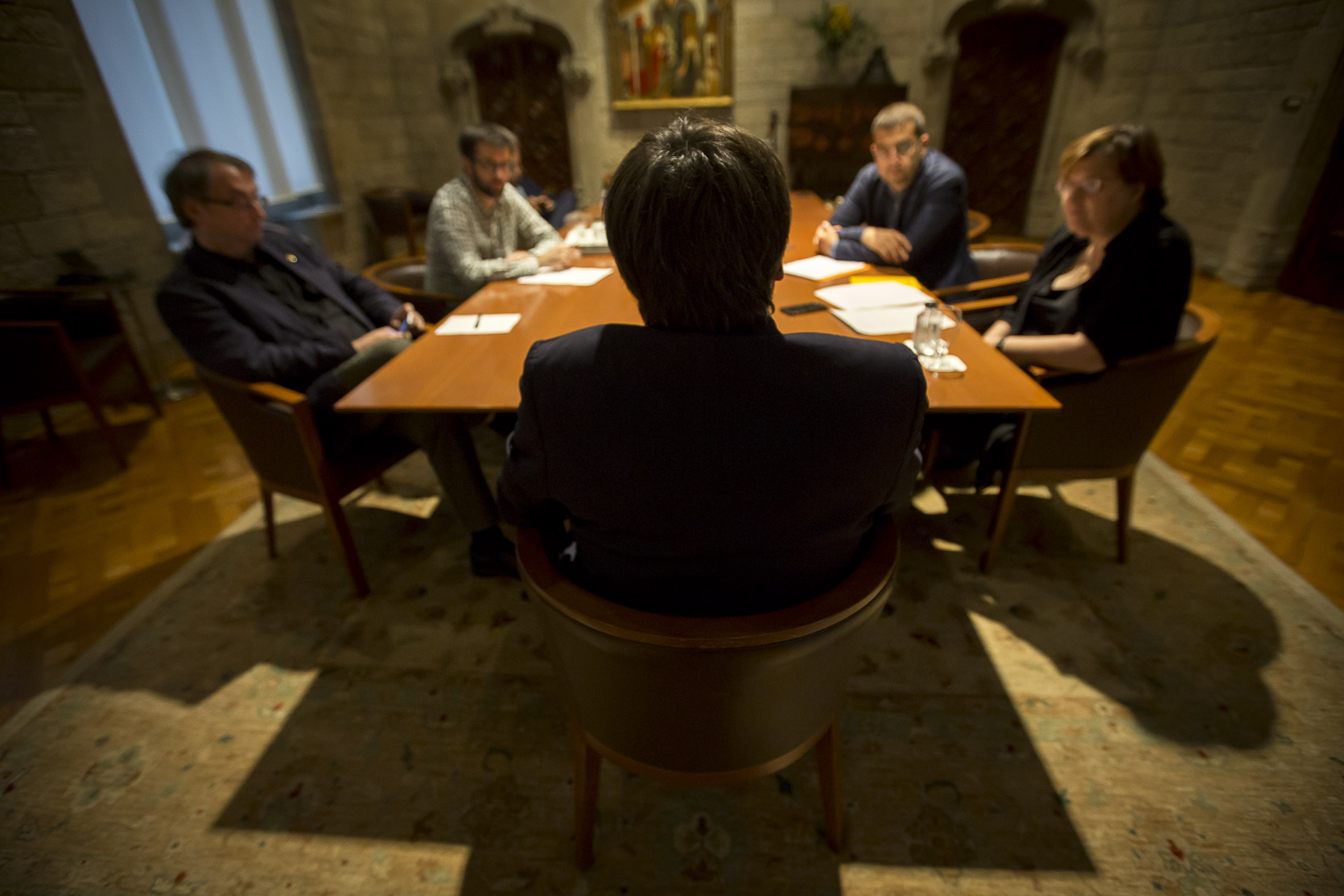17.09.2017 - 01:49
|
Actualització: 19.09.2017 - 11:57
With only fifteen days to go before Catalonia holds a self-determination referendum, we join president Carles Puigdemont in his office for an interview amid a deluge of news about Spain’s police and judicial actions targeting ballot boxes, mayors, ballot slips and Catalan media. It is hard to anticipate what else they will have done by the time our interview is over. Events are unfolding rapidly and the thought of taking an hour off sends your head spinning. Puigdemont talks about the coming two weeks that separate us from a historic day for Catalans. He also discusses Madrid’s repressive attempts in the last days and gives his opinion on how far the Spanish state is prepared to go. He warns that staying at home on October 1 is akin to endorsing PM Rajoy and his policies. During our conversation, we learn that Spanish Guardia Civil officers have turned up at VilaWeb’s HQ. We discuss this briefly. The president —his smile unfading— suggests that we carry on as normal, without a fuss, while he shows us the open letter that a cross-party group of Danish MPs has sent to Mariano Rajoy to complain about Spain’s anti-democratic stance on Catalonia.
—Plenty of international news in just a few hours. First the US State Department, then Juncker’s words and now the Danish MPs’ letter, whose tone is very firm.
—In forty-eight hours we have witnessed developments where there had been none for years. I believe it is no coincidence. The letter by the Danish MPs is indeed very explicit, very firm, and I think it clearly reflects Europe’s mainstream thinking on Catalonia’s issue with Spain. It is written in the sort of language filled with democratic legitimacy that you expect from Nordic countries. Why does Rajoy refuse to engage in politics? Why won’t he listen to our demands? Why won’t he sit down for talks? That is all they are asking, with no preconceptions, and that is all there is to it. But all things change, eventually.
—Were you surprised at Juncker’s statement? Does it signal a shift? Is it a warning to the Spanish government?
—The EU’s public position on the matter is not the same as what is said privately, where realpolitik prevails. It is true that Europe is concerned about the Spanish government’s failure to address an issue that could become a European problem. Juncker’s words are not a mistake, they aren’t a slip of the tongue. He meant what he said and he was looking to send a particular message. I am not surprised by either of those things. I understand that governments aim to protect each other, but exceptional political problems such as this one require a European-style solution, for everyone’s sake, and that means not skirting the subject. Brexit is an unpleasant issue, but Europe must deal with it and approach it in the most pragmatic way. When things happen, you cannot deny reality. If Catalonia becomes an independent country, political realism will have to prevail.
—Have international media changed their point of view? Le Monde’s editorial and other recent news items would seem to suggest that.
—As people abroad have gained a better understanding of what was going on in Catalonia, news outlets have shunned the simplistic propaganda espoused by Spain’s diplomacy. They have realised that everything was more complex, that it was necessary to remain skeptical of the initial version of any event —ours and Spain’s— and go one or two clicks further. Reporters strive to get the facts and to get them right. Nowadays, when you meet a group of foreign journalists, you notice that the breadth of their knowledge and their questions are miles from what we used to get five years ago. They know what they are talking about, they have read up on it. Because there’s an interest, it is easier to get rigorous reporting instead of a broad-strokes story. They soon learn that reality is not like it had been presented to them, which encourages accurate reporting. When this is achieved normally, our position is better understood, which does not mean it is shared.
—Only a few weeks ago you were in Denmark. There must have been a lead-up to that, with explanations given …
—We have always been ridiculed with claims that nobody abroad wanted to meet us, that we are ignored. We always reply that we do not ask for meetings. Furthermore, we cannot expect any recognition because we still don’t know whether the Catalan people want Catalonia to be an independent country. We will find out on the evening of October 1. However, we do aim to enlighten because a time will come when —assuming we have a Yes win— third countries will have to take a stand and we would like their position to be as informed as possible, not based merely on reports written by Spain’s diplomatic service, but also on opportunities to check facts, to ask, to voice doubts … And that is going really well. Anywhere we have travelled and with everybody who’s come to listen, it’s worked out really well. I was in Denmark a few weeks ago and the trip served this purpose nicely. I am pleased that our government’s information-sharing strategy is having the desired effect.
—Today the Spanish government have announced a step further in the takeover of Catalan finances: they aim to remove your government from the management of Catalonia’s coffers. How do you intend to respond to that?
—It looks as if the Spanish government is virtually applying articles 116 and 155 [of the Spanish Constitution] without having formally invoked them. In practice, they have declared a state of exception: public events are banned, referendum print material is seized, newspapers are intimidated and there is a general feeling of being persecuted among all Catalan mayors … It’s the sort of thing you would expect in a state of exception, but this hasn’t been declared. Additionally, we have been told about this full-on financial takeover, of which we have received no notice in writing. We must carry on. If Madrid keeps thinking that the answer to Catalonia’s political problem is not what the Danish MPs have pointed out, that it is not what most political groups in Catalonia have endorsed, if Madrid believes that stepping up the judicial pressure and persecution will help to resolve the problem, then there is no chance that we can share the same playing field.
—Does Madrid have the actual capacity to carry their threats through?
—Catalonia’s finances were taken over a long time ago, regardless of Madrid’s current dramatics. One of our problems is the fact that we have been controlled by this notion of self-rule for a long time. So we must see what all this amount to, in practice.
—Do you see that as the lead-up to invoking article 155?
—The Spanish government have every instrument at their disposal. Madrid fast-tracks legislation and rushes bills through parliament, such as the new law granting the Constitutional Court extraordinary powers which I expect they’ll want to use some day. And then there’s article 155 … Well, we must carry on and do our own thing. Every day that goes by and brings us closer to October 1, our position becomes stronger. Holding your ground is fundamental in this strategy. In the last eighteen months we have got this far by holding our ground.
—You seem very confident that people will be able to vote on October 1. Are the referendum logistics truly ironclad?
—We knew the kind of conditions in which a referendum would be held, if the Spanish government did not endorse it. So we thought it all through, in case we couldn’t come to an agreement with Madrid, which would complicate matters further. And we have been working on that assumption. We have the utmost responsibility to ensure that the Catalan people get to vote on October 1. We are well aware of that.
—Will the Mossos d’Esquadra [Catalan Police] uphold the Catalan law?
—I think it is convenient to stress that the Mossos d’Esquadra, as do all European law enforcement agencies, understand that preserving security is a central pillar of democracy. Make no mistake: at no point will our police fail to comply with their duty to protect the general public. Their priorities aren’t going to change and they will do their job at all times. This is no laughing matter, given that we are at level 4 out 5 on the terror alert scale. Resources must be prioritised to ensure that the Mossos d’Esquadra can carry out their duties and responsibilities. I’ll say it one more time: our police does not call or cancel a ballot.
—With all this crackdown, Madrid is hoping for a low turnout so that the referendum loses its legitimacy.
—The Spanish authorities are determined to impede the vote, whatever it takes. Anything short of that will be understood as a failure. We need to realise that Madrid will do whatever it takes to stop the referendum and we will do everything we can to make it happen. As polling stations begin to close and the result is announced, we will see what the situation is. Our obsession and top priority is for October 1 to be an ordinary voting day. We want to get there as normally as possible and having mustered every support.
—What should the general public be aware of on October 1 when they leave home that morning?
—First of all, they must realise that they have the power to change things to an unprecedented extent. And people of my generation, who never got a chance to vote the Spanish constitution or Catalonia’s first statute, will have that power in their hands. The power to shape a state and a country. Having an awareness of this puts the people centre stage and affords them a great deal of power. It is the people’s time. October 1 is the time of the people. I believe that politics will have achieved everything that could be achieved, but it won’t determine the result of the referendum. The people will. When they take a step forward, they should be aware of the huge power invested in them. Their power will change things. They will have that real capacity.
—On September 11 [Catalonia’s National Holiday], with the streets of Barcelona filled with demonstrators, did you feel that people were empowered? What about when you visit places? Can you feel that?
—Yes, it could be seen in Valls, when people reacted [to Spanish police raiding a local paper]. You can feel it these days, when print shops are being searched, and it was palpable in Tarragona, [at the campaign’s kick-off event]. You can feel that when you travel across Catalonia and you can feel that people realise that this concerns them. This is not about a handful of political leaders and the institutions. We’ve gone to all this trouble —mayors, MPs, cabinet ministers— because we are committed to doing what the public expects from its leaders. And people reflect that trust back. And there will be plenty of that on October 1.
—Did you expect the Spanish government’s reactive demeanour, trailing behind Catalan politics?
—For a long time now, we have been surprised by the inability of some to engage in politics. Spain’s Partido Popular and the Spanish political system in general have given up politics. They’ve resorted to everything, including using judges, prosecutors, courts of law, unsanctioned police operations, business people and media. They’ve resorted to every method but politics, which happens to be the right one. Spain’s political system was expected to make an effort, but they haven’t. And that applies to both the PP and the Socialist Party. For forty years, they have been politically idle. We have not had a single political proposal for Catalonia coming from Spain. They’ve always lived off Catalonia’s proposals for Spain. Always. They’ve had a cozy life. And that might have been one of the mistakes made by Catalanism.
—How do you mean?
—If we look back on the last forty years, particularly the last few, and we look for Spain’s proposals at times of huge discrepancies, we will find none. And when we tell them that the referendum might help us to resolve our differences and we ask them to put forward a proposal, they are unable to come up with one. In the best case scenario, some mention the idea of a federal or a plurinational Spain. But when they were in office, they failed to make any moves towards a federal or a plurinational solution. What credibility do they have? None whatsoever. Indeed, I am surprised by Spain’s lack of political action and its inability to engage with us politically.
—As time goes by, a good deal of Madrid-based news outlets are becoming increasingly critical of Rajoy’s behaviour. Do you think the Partido Popular will make it to October 1 in one piece?
—I don’t know and, to be honest, I don’t care all that much. If we have decided to free ourselves, assuming a Yes win, then anything that Spain’s political system decides on the next day will no longer concern us. Besides, I do not see a big rift [within the PP]. Actually, it strikes me that Spanish media is rather one-sided. They present a united front with Madrid’s government. And it’s not just news outlets: it is the Socialist Party as well, not to mention Ciudadanos, which is an extension of the PP, their home brand name. They have uncritically sided with PM Rajoy. In my opinion, in the event of a poor turnout, if October 1 shouldn’t go well, Mr Rajoy’s position would be strengthened, together with the sort of Spain that his party embodies. Nobody in Catalonia would understand it, if our inaction ultimately boosted Mr Rajoy’s standing.
—What would have to happen for the referendum not to go well?
—We have not set a minimum quorum. But, obviously, a 5-10 per cent turnout would not be helpful. But if the vote does goes through and our expectations are exceeded, there will be no reason for concern. If it doesn’t work out, it will be due to a catastrophe that we do not anticipate. Staying home aids Mr Rajoy and the policies that have brought us to the current state of affairs. That’s what I meant when I said if things didn’t work out. Rajoy’s Spain will capitalise on the consequences of choosing not to vote.
—If we went ten years back in time, could you imagine that some leaders on the left, such as Miquel Iceta and Joan Coscubiela, would be on the opposite camp?
—That’s a difficult question because ten years ago none of us could have probably imagined that we would be where we are today. And if they could have imagined it, then they might have refrained from saying some of the stuff they used to say, which conflicts with their actions today. But everyone must try to do the right thing and, in time, they will need to explain their attitude at a critical crossroads in the history of Catalonia. I try to show respect for everyone’s decisions and I hope they will reciprocate. Everyone will be held accountable for their choices and over a long time. A very long time.
—You had mentioned that the only circumstance in which it would be justified to call off the referendum would be to avoid putting people in harm’s way. What do you mean by that?
—We must not allow panic-mongering and fear tactics to prevail. The Spanish government wants to drag us down that road. No way. The only chance of halting the vote on October 1 would be for the Spanish authorities to agree to hold talks and show its commitment to negotiating a mutually-agreed referendum. We’ve always said so and still do. Will it happen? It won’t. Every request that we have ever made has been met with scorn. And, unfortunately, that is not going to change. The best course of action for everyone would be to agree to hold a referendum. There’s no doubt about it. But it’s not going to happen. The Catalan people have shown that, although we might feel apprehensive, our response is a hopeful, courageous, joyful one.
—You recently sent PM Rajoy a letter with yet another offer of a referendum. To what extent was it an honest proposal or just a tactical move?
—It was entirely honest. They have it in writing. I would like to emphasise that the letter expresses everything I have been saying in public, everywhere, about how the Spanish government ought to react. It is a much-repeated invitation and we have now reiterated it in our joint letter [written jointly with the top Catalan political leaders]. It’s entirely sincere. Was this the right time to send it? It was. We have entered the final phase. And the Spanish government should understand that many others around the world are demanding the same as we do. A growing number of people are. The Spanish government has a chance to use politics. We will not let them down.
—King Felipe has received a copy of the letter. How do you feel about his role so far?
—If he truly wanted to be the king of all Spanish citizens, he should also be the king of the two million plus Catalans who voted for a pro-independence party on September 27. The king’s conduct should reflect the fact that in Catalonia people feel a certain way and they’ve not had a political response yet. He should know about it. It is up to him to choose the role he wants to play at such a historic moment. That’s why we sent him a copy of our letter. It was not addressed to him as such. We copied him on it.
—Your letter was signed by Barcelona mayor Ada Colau, too. How do you explain her U-turn [on the referendum] in the last few days?
—To be honest, I had always seen and read that Mayor Colau supports the right to decide. Of course, a decision here or a soundbite there might have pointed more in one direction or another. But I have not seen a shift in her position. The political space that she represents in Barcelona city is one where many wish to vote, and she is aware of it. We have found a way to channel her democratic commitment with her desire to protect the institution and its public employees. We have reached a very positive understanding that will allow Barcelona city residents to vote normally.
—The Spanish state is fighting this battle the old way. They used to ban stencils and now they raid print shops. Do you feel that Catalan separatists have the upper hand on social networks, that there is a novel understanding of public performance?
—The people are what makes us strong. The power is in their hands, whereas Madrid is still operating under a 20th century logic and with a 19th century mentality. They don’t realise that a profound social transformation is underway and countries are changing. Countries will no longer have a single way of thinking, a single language … They will be diverse and changing. They will advance to the beat of technological change, which now plays a foundational role in civilisation. Therefore, the people who have built such changes into their lives cannot understand how they may interact and communicate with the whole world, but are not allowed to decide on something that concerns their own nation. People cannot understand that. The old nation-states that fail to grasp this transformation are bordering on collapse. Their foundations are shaking. For instance, they don’t understand that they can’t shut down a website when they want to, because there are places where they cannot reach.
—Is that the battlefield?
—As well. The match is being played on the field of communication, narrative, technology, social networks … We realise that the Spanish state is very powerful, very strong, seemingly limitless. We will not play that down. We have one strength, too. Several, actually. The people. They are very important. And we possess the limberness that comes with wanting to build a modern, brand new country. We do not wish to clone the old countries. If this was about doing the same thing with a new name, we wouldn’t bother with it. And Catalonia is so much more nimble. Today being large or small might have the opposite effect as in the 19th and 20th centuries. Nowadays, large countries are slow to respond to the pace of change. Change is fast-paced. It’s no accident that small countries are the top of the world’s progress and well-being indexes.
—You’re a journalist by trade. Has it helped you in this situation?
—Yes, it’s been a big help. All my life, it has. And at a time when communication is of paramount importance, it is helpful to have a journalist’s view.
—What do you think about the news bias in Madrid-based media?
—I am worried about the loss of independence and reporting diversity in Spain’s communication system. There is a media bubble in Spain which does not let anything in or out, unless is adheres to a particular view of things. That is worrisome for a democracy. And, to a point, it might account for the trouble that the Spanish news industry find itself in Spain. I am pessimistic about it. As people get their news through other channels, any attempt to prop up a system devoid of independent thinking will likely fail because society won’t necessarily go along with it. It is here where many forecasts get it wrong. We have seen some media openly endorse a certain election candidate, only to see them go on to fail miserably.
—One of the messages coming from those news outlets is that the Catalan economy is in tatters. What is your government hearing about that?
—We are hearing two messages. First, there’s the business people who work in Catalonia and want to invest here. They have every confidence in Catalonia. The other message stems from hard data and it is unquestionable. I won’t go as far as saying that there is a cause-and-effect connection between Catalonia’s independence process and direct foreign investment, exports and growth. But if there was such a connection, it would be the exact opposite [of what Madrid has traditionally claimed]. Before the start of Catalonia’s independence process, our nation’s exports were less and we received less direct investment than today. Does that mean the prospect of independence is encouraging investors? That would be a ludicrous statement. But claiming the opposite is equally ludicrous. As the chairman of Ryanair recently said, business is business. And companies who are looking for a business opportunity will seize it, regardless. It is a proven fact. Firms adapt to new situations, whether they like them or not.
—At any rate, business dislikes instability. Could that be a handicap for the day after the referendum?
—It is important that we all understand —and, by all, I mean the EU, Spain and Catalonia— that in the event of a Yes win, it is in everyone’s best interest to sit down to discuss the terms of the transition starting on October 2. On this point, I can give full assurance that my government will remain committed to maintaining legal security. It is a strong cabinet that will continue to govern with the trust of the people and the Catalan parliament. We will strive to preserve stability and ensure it is business as usual in Catalonia.

